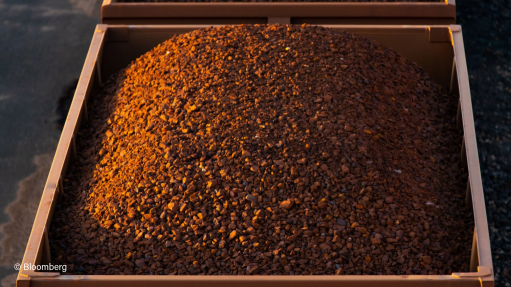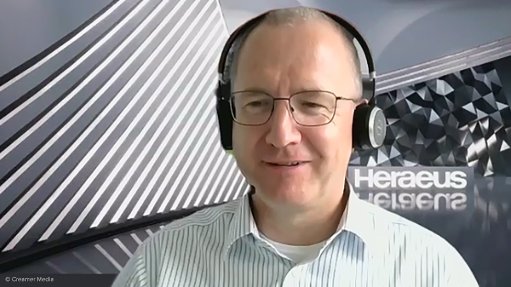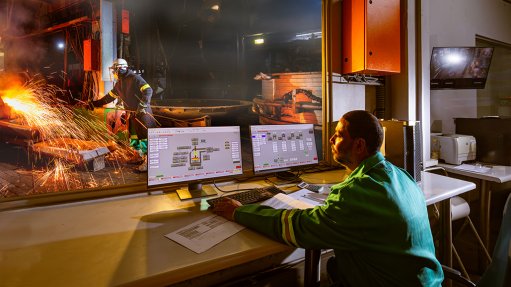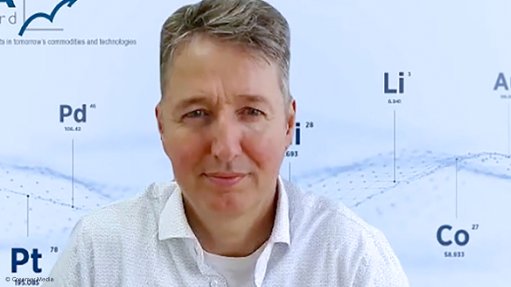PGM recycling, lower-grade resources offer opportunities in low-price environment
With the platinum group metals (PGM) basket price remaining at low levels, particularly with platinum pricing at about $935/oz currently, investors are looking at how mining companies are able to generate free cash flow, the cost of their operations and their commodity mix.
Commenting on investors’ sentiment towards PGMs at the moment, JP Morgan metals and mining equity analyst Catherine Cunningham says investors favour the companies that are best able to weather the storm, should it continue for longer.
She adds that investors also consider who can credibly execute on targets that have been outlined, rather than focusing on the cyclicality that is inherent with commodities.
Cunningham elaborates that investors are cognisant of the serious and near-term challenges that are affecting PGM producers, which are impacting on capital returns.
“The investment community is moving away from focusing on the demand side, especially demand for platinum in the automotive sector, to being more focused on the supply side, particularly on the idea of supply cuts.
“In the absence of any sizeable supply cuts coming through, it has become a ‘wait and see’ approach to see which companies can weather these conditions and execute on targets that have been outlined,” Cunningham explains.
She points out that there are longer dated themes that are relevant to the PGM sector, which means a rebound in the price may occur, hence the importance of companies being able to survive the short-term storm.
Commenting on potential new sources of PGM demand such as hydrogen, Cunningham says there are positive developments on the horizon in the medium term; however, there are challenges on the scalability of technology and gaps between policies incentivising supply and demand, with the latter still lacking in most parts of the world.
Nedbank Corporate and Investment Banking mining and chemicals sector lead Vusi Mpofu, meanwhile, says there is increasing pressure to manage carbon emissions in many parts of the world, including Europe and the US, to which PGMs are a key.
He adds that lenders continue to support responsible stewardship and take into account the historical levels of demand for the commodity and how companies have managed to cope in prior downturned cycles.
Mpofu notes that there will definitely be a reduction in capital returns to shareholders at the moment, and companies are implementing cost containment measures to offset the lower pricing.
Fortunately, the price booms in recent years have allowed companies to strengthen their balance sheets, with most companies being in better shape compared with prior downturned cycles.
SBC Securities mining equities analyst Adrian Hammond comments that a number of events have impacted on the supply and demand of PGMs, including Covid-19, Eskom’s electricity supply disruptions in South Africa and Russian/Ukrainian flows of goods, with ‘panic demand’ having sent palladium prices upward of $3 000/oz and rhodium upward of $30 000/oz, for example.
There is a destocking cycle happening, he explains, adding that the PGM sector is experiencing a surplus of supply. However, with little investment happening in brownfield and greenfield PGM projects, the sector will experience shortages at some point in the future.
“When all the nuances around the destocking cycle ends, which is affecting mostly palladium, things still look promising,” Hammond states.
He says the market is missing increased recycling of automotive catalytic converters.
“Recycling is a long-term structural growth opportunity, but many incentives are lacking,” Hammond adds.
Sibanye-Stillwater recycling head Grant Stuart agrees that PGM recycling is a substantial source of supply, given that catalytic converters have comprised 25% of the overall PGM market for many years.
There are ample end-of-life assets to recycle, he says.
In 2023, 19% of gross platinum demand was met from recycled material. Recycled material also accounted for 23% of palladium demand and 28% of rhodium demand, he explains.
“With an understanding of loadings and scrappage rates, we can estimate when catalytic converters will ‘come back’ into the market.”
As demand for green metal grows, there is increasing opportunity to recycle metals back into the market. Stuart says companies have to determine which waste streams are viable to take in, considering the contained metals, as well as the adaptability of refineries to process this material.
Sylvania Platinum CEO Jaco Prinsloo says primary production of PGMs has become lossmaking for many producers at current prices, especially those with deeper resources that are more capital intensive to mine.
He states that primary suppliers of PGMs can benefit from recycling and mining lower-grade resources in times when prices are lower. It also helps to lower groupwide carbon emissions when primary producers start recycling secondary material.
Tharisa CEO Phoevos Pouroulis agrees that mining companies are increasingly forced to unlock more value from resources, since high-grade reefs are depleting.
Tharisa has been trialling a small-scale smelter to prove the concept of rightsizing smelting capacity to production, to produce saleable products such as alloys. This serves as a low-cost opportunity to unlock the treatment of historically untreatable ores.
Pouroulis says there is a 12% to 15% margin that can be captured from producing refined metals, compared with only concentrates.
*The speakers quoted above participated in the PGMs Industry Day, held in Johannesburg, on April 10.
Comments
Announcements
What's On
Subscribe to improve your user experience...
Option 1 (equivalent of R125 a month):
Receive a weekly copy of Creamer Media's Engineering News & Mining Weekly magazine
(print copy for those in South Africa and e-magazine for those outside of South Africa)
Receive daily email newsletters
Access to full search results
Access archive of magazine back copies
Access to Projects in Progress
Access to ONE Research Report of your choice in PDF format
Option 2 (equivalent of R375 a month):
All benefits from Option 1
PLUS
Access to Creamer Media's Research Channel Africa for ALL Research Reports, in PDF format, on various industrial and mining sectors
including Electricity; Water; Energy Transition; Hydrogen; Roads, Rail and Ports; Coal; Gold; Platinum; Battery Metals; etc.
Already a subscriber?
Forgotten your password?
Receive weekly copy of Creamer Media's Engineering News & Mining Weekly magazine (print copy for those in South Africa and e-magazine for those outside of South Africa)
➕
Recieve daily email newsletters
➕
Access to full search results
➕
Access archive of magazine back copies
➕
Access to Projects in Progress
➕
Access to ONE Research Report of your choice in PDF format
RESEARCH CHANNEL AFRICA
R4500 (equivalent of R375 a month)
SUBSCRIBEAll benefits from Option 1
➕
Access to Creamer Media's Research Channel Africa for ALL Research Reports on various industrial and mining sectors, in PDF format, including on:
Electricity
➕
Water
➕
Energy Transition
➕
Hydrogen
➕
Roads, Rail and Ports
➕
Coal
➕
Gold
➕
Platinum
➕
Battery Metals
➕
etc.
Receive all benefits from Option 1 or Option 2 delivered to numerous people at your company
➕
Multiple User names and Passwords for simultaneous log-ins
➕
Intranet integration access to all in your organisation





















